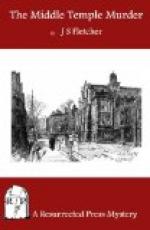All this led up to the appearance of Mr. Aylmore, M.P., in the witness-box. And Spargo knew and felt that it was that appearance for which the crowded court was waiting. Thanks to his own vivid and realistic specials in the Watchman, everybody there had already become well and thoroughly acquainted with the mass of evidence represented by the nine witnesses who had been in the box before Mr. Aylmore entered it. They were familiar, too, with the facts which Mr. Aylmore had permitted Spargo to print after the interview at the club, which Ronald Breton arranged. Why, then, the extraordinary interest which the Member of Parliament’s appearance aroused? For everybody was extraordinarily interested; from the Coroner downwards to the last man who had managed to squeeze himself into the last available inch of the public gallery, all who were there wanted to hear and see the man who met Marbury under such dramatic circumstances, and who went to his hotel with him, hobnobbed with him, gave him advice, walked out of the hotel with him for a stroll from which Marbury never returned. Spargo knew well why the interest was so keen—everybody knew that Aylmore was the only man who could tell the court anything really pertinent about Marbury; who he was, what he was after; what his life had been.
He looked round the court as the Member of Parliament entered the witness-box—a tall, handsome, perfectly-groomed man, whose beard was only slightly tinged with grey, whose figure was as erect as a well-drilled soldier’s, who carried about him an air of conscious power. Aylmore’s two daughters sat at a little distance away, opposite Spargo, with Ronald Breton in attendance upon them; Spargo had encountered their glance as they entered the court, and they had given him a friendly nod and smile. He had watched them from time to time; it was plain to him that they regarded the whole affair as a novel sort of entertainment; they might have been idlers in some Eastern bazaar, listening to the unfolding of many tales from the professional tale-tellers. Now, as their father entered the box, Spargo looked at them again; he saw nothing more than a little heightening of colour in their cheeks, a little brightening of their eyes.
“All that they feel,” he thought, “is a bit of extra excitement at the idea that their father is mixed up in this delightful mystery. Um! Well—now how much is he mixed up?”
And he turned to the witness-box and from that moment never took his eyes off the man who now stood in it. For Spargo had ideas about the witness which he was anxious to develop.




